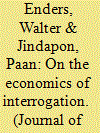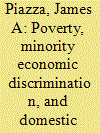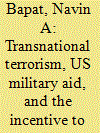|
|
|
Sort Order |
|
|
|
Items / Page
|
|
|
|
|
|
|
| Srl | Item |
| 1 |
ID:
106026


|
|
|
|
|
| Publication |
2011.
|
| Summary/Abstract |
This article investigates the adverse effects of domestic and transnational terrorism on income per capita growth for 51 African countries for 1970-2007, while accounting for cross-sectional (spatial) dependence and conflict (i.e. internal conflicts and external wars). The findings of the fixed-effects panel estimator suggest that transnational terrorism has a significant, but modest, marginal impact on income per capita growth. These results hold for two different terrorism event datasets. However, domestic terrorist events do not affect income per capita growth. Our findings differ from those in an earlier study on the impact of transnational terrorism on African growth, because we uncover a much more moderate effect. In our study, regional impacts and terrorism-conflict interactions effects are also distinguished. Moreover, our sample countries and period are more extensive. Our article contains a host of robustness checks involving macroeconomic and political variables that find virtually identical results. Alternative terrorist variables are also used, with little qualitative change in the findings. The absence of a domestic terrorism impact is surprising because there were many more domestic than transnational terrorist incidents in Africa. To promote growth, host and donor countries must direct scarce counter-terrorism resources to protect against transnational terrorism in particular. The modest impact of transnational terrorism on African growth means that developing countries' economies have been more resilient to terrorism than has been generally thought.
|
|
|
|
|
|
|
|
|
|
|
|
|
|
|
|
| 2 |
ID:
106024


|
|
|
|
|
| Publication |
2011.
|
| Summary/Abstract |
This article devises a method to separate the Global Terrorism Database (GTD) into transnational and domestic terrorist incidents. This decomposition is essential for the understanding of some terrorism phenomena when the two types of terrorism are hypothesized to have different impacts. For example, transnational terrorism may have a greater adverse effect than domestic terrorism on economic growth. Moreover, the causes of the two types of terrorism may differ. Once the data are separated, we apply a calibration method to address some issues with GTD data - namely, the missing data for 1993 and different coding procedures used before 1998. In particular, we calibrate the GTD transnational terrorist incidents to ITERATE transnational terrorist incidents to address GTD's undercounting of incidents in much of the 1970s and its overcounting of incidents in much of the 1990s. Given our assumption that analogous errors characterize domestic terrorist events in GTD, we apply the same calibrations to adjust GTD domestic incidents. The second part of the article investigates the dynamic aspects of GTD domestic and transnational terrorist incidents, based on the calibrated data. Contemporaneous and lagged cross-correlations for the two types of terrorist incidents are computed for component time series involving casualties, deaths, assassinations, bombings, and armed attacks. We find a large cross-correlation between domestic and transnational terrorist incidents that persists over a number of periods. A key finding is that shocks to domestic terrorism result in persistent effects on transnational terrorism; however, the reverse is not true. This finding suggests that domestic terrorism can spill over to transnational terrorism, so that prime-target countries cannot ignore domestic terrorism abroad and may need to assist in curbing this homegrown terrorism.
|
|
|
|
|
|
|
|
|
|
|
|
|
|
|
|
| 3 |
ID:
106021


|
|
|
|
|
| Publication |
2011.
|
| Summary/Abstract |
This article opens the special issue by identifying the main contributions to date of the empirical and theoretical literature on terrorism. Important past theoretical articles investigated the application of game theory to study interactions among adversaries (e.g. terrorists and governments) and allies (e.g. commonly targeted governments). Past empirical articles examined the effectiveness of counter-terrorism policies, the root causes of terrorism, the dynamics of terrorist attacks, and other topics. This introduction also indicates new areas of research emphasis - e.g. the study of suicide terrorism and foreign aid as a counter-terrorism tool. Next, the introduction highlights some key definitions - e.g. domestic and transnational terrorism - that are applied throughout the special issue. Each article of the special issue is then introduced and briefly discussed. These articles display a rich diversity of topics and methods; nevertheless, they enlighten the reader on the consequences of terrorism. Topics in the special issue include the social impact of interrogation methods; the consequences of aid-assisted counter-terrorism; the roots of domestic terrorism; the adverse effect of terrorism on growth; the use of experiments to study counter-terrorism; the relationship among terrorism, trust, and income; and legislative responses to transnational terrorism. The two main event datasets - International Terrorism: Attributes of Terrorism Events (ITERATE) and Global Terrorism Database (GTD) - are also compared.
|
|
|
|
|
|
|
|
|
|
|
|
|
|
|
|
| 4 |
ID:
106022


|
|
|
|
|
| Publication |
2011.
|
| Summary/Abstract |
While military protocol requires that POWs provide only name, rank, serial number, and date of birth (the so-called Big 4), it is naive to think that all detainees, including terrorists, behave in this fashion. Instead, there is evidence that detainees partially cooperate with their captors by revealing a limited amount of valuable information during the interrogation process. Such a strategy makes it appear that the detainee is cooperative and, since interrogations can be costly, serves as a disincentive for further interrogation. In order to capture the essential differences between the two strategies, we model two different types of games between the interrogator and the detainee. Specifically, we compare the Big 4 game to a two-stage game (the Little Fish game) in which the detainee is permitted to reveal low-level information to the interrogator. We formalize both games, derive the optimal rules for each player, and show that the Big 4 game may not be optimal for either player or for the overall well-being of the interrogating nation. As such, the Little Fish game can Pareto-dominate the Big 4 game. Hence, it is possible that the al-Qaeda strategy of partial cooperation is superior to that used by most standing armies. We also show that the level of intensity selected by the interrogator must be balanced by such factors as the moral values of the society and recruiting potential of the terrorists versus the likelihood of obtaining important information.
|
|
|
|
|
|
|
|
|
|
|
|
|
|
|
|
| 5 |
ID:
106025


|
|
|
|
|
| Publication |
2011.
|
| Summary/Abstract |
Recognizing that the empirical literature of the past several years has produced an inconclusive picture, this study revisits the relationship between poverty and terrorism and suggests a new factor to explain patterns of domestic terrorism: minority economic discrimination. Central to this study is the argument that because terrorism is not a mass phenomenon but rather is undertaken by politically marginal actors with often narrow constituencies, the economic status of subnational groups is a crucial potential predictor of attacks. Using data from the Minorities at Risk project, I determine that countries featuring minority group economic discrimination are significantly more likely to experience domestic terrorist attacks, whereas countries lacking minority groups or whose minorities do not face discrimination are significantly less likely to experience terrorism. I also find minority economic discrimination to be a strong and substantive predictor of domestic terrorism vis-à-vis the general level of economic development. I conclude with a discussion of the implications of the findings for scholarship on terrorism and for counter-terrorism policy.
|
|
|
|
|
|
|
|
|
|
|
|
|
|
|
|
| 6 |
ID:
106028


|
|
|
|
|
| Publication |
2011.
|
| Summary/Abstract |
Previous research has shown that trust is an important component that encourages investment and capital formation which, in turn, enhances economic performance. This article investigates the effect of terrorism on income, including its indirect role through lowering trust. We consider terrorism as a factor that can increase the cost of investing in technology and capital formation due to its ability to diminish trust in an economy. We then develop a novel and rich dataset spanning 179 countries from 1968 to 2007 using associated community, social, cultural, political, and economic factors from the World Values Survey and international terrorism incidence data from ITERATE. Using empirical tests, we first show that terrorism has a negative and statistically significant impact on individual income. This impact is larger than what has previously been found, possibly due to aggregation effects and data selection. We then estimate the societal impact of terrorism on economic growth by examining the extent to which terrorism taxes trust and how this, in turn, hinders economic performance. Consequently, we develop a measure of the economic consequences of terrorism through sizing the magnitude of the 'trust tax' from terrorism. We find that the trust tax is relatively minor compared to the direct impact of terrorism on income.
|
|
|
|
|
|
|
|
|
|
|
|
|
|
|
|
| 7 |
ID:
106027


|
|
|
|
|
| Publication |
2011.
|
| Summary/Abstract |
Experimental research has a long-established tradition in psychology and sociology, and a more recent but important history as a useful methodology in economics. In this article, we discuss the strengths and weaknesses of experiments as a method for studying terrorism and other national security topics. For example, given the paucity of data on counterterror policy decisions by governments, as well as for planning, targeting and selecting methods of attack by terrorist organizers, the experimental approach can substitute for this lack of field data. Experiments can also identify policy counterfactuals that might otherwise be unobservable. Hence, we begin by discussing several theoretical themes in the analysis of terrorism: interdependent security games such as airline screening; the dual nature of pre-emptive versus deterrent counterterror policies and the implications of this duality for policy coordination among targeted nations; the resurgence of interest in Colonel Blotto games when properly adjusted to reflect the asymmetric conflict between target governments and terrorist groups; and the relationship between terrorist activity and extreme punishments (or vendettas). The small but emerging literature using experiments to examine these issues is reviewed, paying particular attention to how experimental results can inform theory and policy. Finally, we propose new directions for researchers to explore.
|
|
|
|
|
|
|
|
|
|
|
|
|
|
|
|
| 8 |
ID:
106023


|
|
|
|
|
| Publication |
2011.
|
| Summary/Abstract |
This study proposes a strategic explanation for the USA's continued provision of military aid to host states with problems of terrorism, despite its poor empirical record. Using a game theoretic model, I demonstrate that US military aid creates a moral hazard problem. If host states are provided with the tools to pacify their territory only if terrorist campaigns are ongoing, but will lose this aid once the problem of terrorism ceases, host states have little incentive to accelerate the demise of terrorist groups. However, the model demonstrates that while military aid does not accomplish the US goal of disarming terrorists, military aid is effective at preventing host states from negotiating with terrorist organizations. The provision of military aid provides a disincentive for host states to reach a negotiated settlement with terrorist groups, and therefore prevents terrorist organizations from altering the status quo that is favorable to the USA. This suggests that while military aid may not be effective at actually disarming terrorist groups, it can be effective at keeping terrorist groups out of power. These hypotheses are tested using the Jones & Libicki (2008) data on terrorism from 1997 to 2006. The empirical results support the conclusions of the theoretical model.
|
|
|
|
|
|
|
|
|
|
|
|
|
|
|
|
|
|
|
|
|